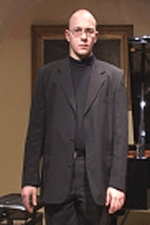> [Archived] Interviews

Interview with Pianist Matei Rogoz
Mr.
Matei Rogoz, thank you for agreeing to provide us with more
information about the recital which you will hold at the Romanian
Cultural Institute in London this evening. What does this concert
mean to you?
Any recital is very important to me and I try to enjoy every single appearance on the stage as much as possible. I am extremely happy that I am going to perform in London. I confess that I will be setting foot in London for the first time in my life.
I
understand that the programme will feature the works of Beethoven,
Enescu and Prokofiev.
Yes, it is a repertoire that I have quite recently prepared. More precisely, I succeeded in publishing my doctoral dissertation in October, 2013. It deals with the Piano Sonata in the 18th and 19th Centuries. It is the outcome of the fact that I have always had an interest in this kind of composition. Obviously, when you say Beethoven you say piano sonata. Prokofiev’s musical piece is also a piano sonata and although it does not belong to the 18th or the 19th century, there are many people who argue that his piano sonatas are neoclassical works. As for Enescu, it is a natural thing for me to introduce his musical pieces into the recital programme for the simple reason that I have organized and I have been in charge of many Enescu event - concerts dedicated to the composer’s works, in the past ten years and also I have particular affinities with Enescu’s music.
You
have recently returned from New York and Washington, is that right?
We are talking about a project proposed by the Romanian Cultural Institute in Bucharest this time, to the prime institution, where there were included a concert tour and the reading of my recently published book. Consequently, I proposed the same recital program in New York and Washington.
The
concert you are going to hold this evening is entitled Sonata
in Sounds and Words. So, Mr. Matei Rogoz, your work is
divided among several projects, including two particularly important
ones, I would say, that of a musician and that of a researcher of the
music phenomenon.
We could say that. I would not either entirely set aside the teaching part because I also love giving piano lessons.
We
wish you a lot of success this evening! Would you like to share some
thoughts with the audience from Romania?
I would be very happy to have the opportunity to perform for them and I wish them to have the means of enjoying music.
Translated by Petronela Morosanu and Elena Daniela Radu
MTTLC, The University of Bucharest














